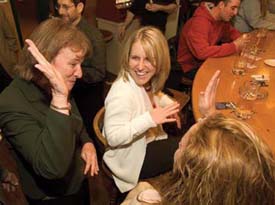 |
 |
| current issue |  |
past issues |  |
send a letter/news |  |
address update |  |
advertise |  |
about us |  |
alumni home |
Features
(Also read: Running In Office-- Three students find mixing academics and politics exhilarating--and tiring)
The Unexpected Congresswoman
They said it couldn't be done. Carol Shea-Porter '74, '79G thought otherwise.
by Sue Hertz '78
To win the Congressional seat in New Hampshire's first district, history dictates that you have to capture Manchester, or at least break even. Carol Shea-Porter '74, '79G knew that as she stood near the doorway of the Rimmon Club that Friday evening before election day. She'd done her best, escorted by a few locals to the new Manchester senior citizen center and the Rotary Club breakfast, confidently marching door to door in the previous weeks asking for support in her quest to become the state's first Congresswoman. But here she lingered by the shuffleboard table in this crowded West Manchester bar, with the Budweiser sign glowing and smoke hanging in the air like fog over Mt. Washington Valley in spring, wondering just how to proceed.
The visit to the West Manchester social clubs was the idea of two city aldermen. Although West Manchester doesn't represent all of Manchester, it represents a certain population, a population of masons and carpenters, descendants of Canadian, Irish, and German immigrants, a population that calls itself Democrat but, more than likely, votes Republican. It's a religious group, mostly Catholic, that reads the right-leaning Union Leader. The aldermen figured that if Shea-Porter, the unknown Rochester Democrat, the long-shot, the candidate whose own party didn't think she would win, could successfully woo 100 of these West Manchester voters, each voter would tell friends and family, and those 100 votes could morph into the thousand that might, just might, capture the state's biggest city. And if she captured the biggest city, the aldermen reasoned, she might defy the overwhelming odds and make history.

|
Shea-Porter exchanged looks with Caroline French '64, one of her campaign advisors. The place was packed, standing room only, since all the leagues--dart, pool, and cards--were in full gear. "What are we going to do?" thought French. "It's Friday night in a bar."
Another look at Shea-Porter, who with her auburn page-boy and casual slacks looked more Pottery Barn than pool hall, told French what they would do. They would do what they had done for the past year. Shea-Porter would work the crowd and French would hand out campaign literature. The woman was fearless, French knew. She would talk to anyone anywhere.
Shea-Porter headed to the dart board. "I don't want to interrupt your game," she said, "but I wanted to introduce myself. I'm Carol Shea-Porter and I'm running for Congress." The darts froze. Heads turned. "What issues would you like to talk about?" she asked.
And she was off. Asking for problems, offering solutions, promising she'd do her best. Even the two tattooed guys at the bar, who had said at first that they liked her opponent, Republican Jeb Bradley, reported to French later that they had changed their minds, that she was "terrific."
French wasn't surprised. She'd seen that reaction, from the affluent Seacoast to the Lakes Region to the hamlets in the White Mountains.

|
Four days later, after the polls had closed and the ballots tallied, Carol Shea-Porter, the candidate who was outspent 10 to one in the primary and five to one in the general election, whose closest advisors were a nutritionist, an antique jewelry dealer, and a medieval scholar, stunned the state--and the country--by winning the coveted spot in the 110th Congress. She claimed Manchester by 1,000 votes. The aldermen, of course, credited the Friday night visit to the social clubs. Others in Manchester attributed the victory to her impressive performance in a debate against Bradley at a local synagogue. Still others felt that Shea-Porter won because she'd knocked on so many Manchester doors.
In the aftershock of the 2006 election, there was no shortage of theories on how a Democrat who had never held public office, who had no money and no name recognition, could triumph over a Republican incumbent in a district that hadn't elected a Democrat to Congress in 31 years. The most common rationale, of course, was that Shea-Porter was lucky. A candidate from the right party at the right time, she benefited from national frustration with President Bush and the war in Iraq. She benefited, too, from the enormous popularity of another Democrat, New Hampshire Governor John Lynch '74, whose name preceded hers on the ballot. And she benefited from a changing demographic; No longer an epicenter of Yankee Republicanism, New Hampshire is one of the fastest growing states in the Northeast and the new residents tend to be independent and well-educated. That combination, according to Andrew Smith, director of the UNH Survey Center, equals more voters leaning left, particularly since many of the new residents emigrated from blue states. Smith predicts that New Hampshire will be all blue within 10 years.
Shea-Porter's win was, Smith says, as clear-cut as if "she had a D on her back and Bradley had an R." Since the public couldn't vote against Bush, it voted against Bradley, and probably of equal importance, adds Smith, the coattails of John Lynch were huge. "People voted the top of the ticket and then straight down."
Page: 1 2 3 4 5 Next >Easy to print version
blog comments powered by Disqus
